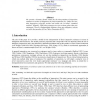Free Online Productivity Tools
i2Speak
i2Symbol
i2OCR
iTex2Img
iWeb2Print
iWeb2Shot
i2Type
iPdf2Split
iPdf2Merge
i2Bopomofo
i2Arabic
i2Style
i2Image
i2PDF
iLatex2Rtf
Sci2ools
CICLING
2003
Springer
2003
Springer
Imperatives as Obligatory and Permitted Actions
We present a dynamic deontic model for the interpretation of imperative sentences in terms of Obligation (O) and Permission (P). Under the view that imperatives prescribe actions and unlike the so-called “standard solution” (Huntley, 1984) these operators act over actions rather that over statements. Then by distinguishing obligatory from non obligatory actions we tackle the paradox of Free Choice Permission (FCP).
CICLING 2003 | Dynamic Deontic Model | Imperatives Prescribe Actions | Natural Language Processing | Non Obligatory Actions |
| Added | 06 Jul 2010 |
| Updated | 06 Jul 2010 |
| Type | Conference |
| Year | 2003 |
| Where | CICLING |
| Authors | Miguel Pérez-Ramírez, Chris Fox |
Comments (0)

